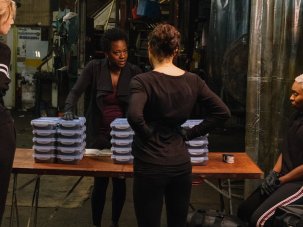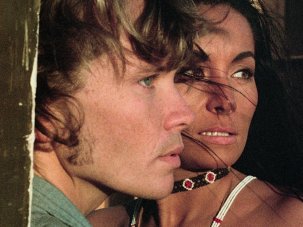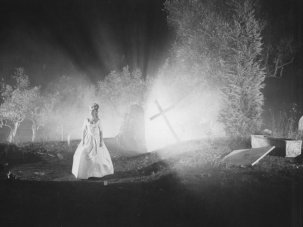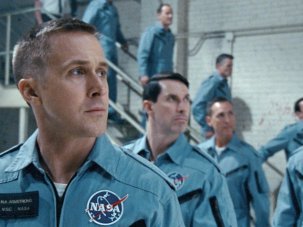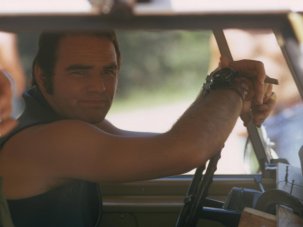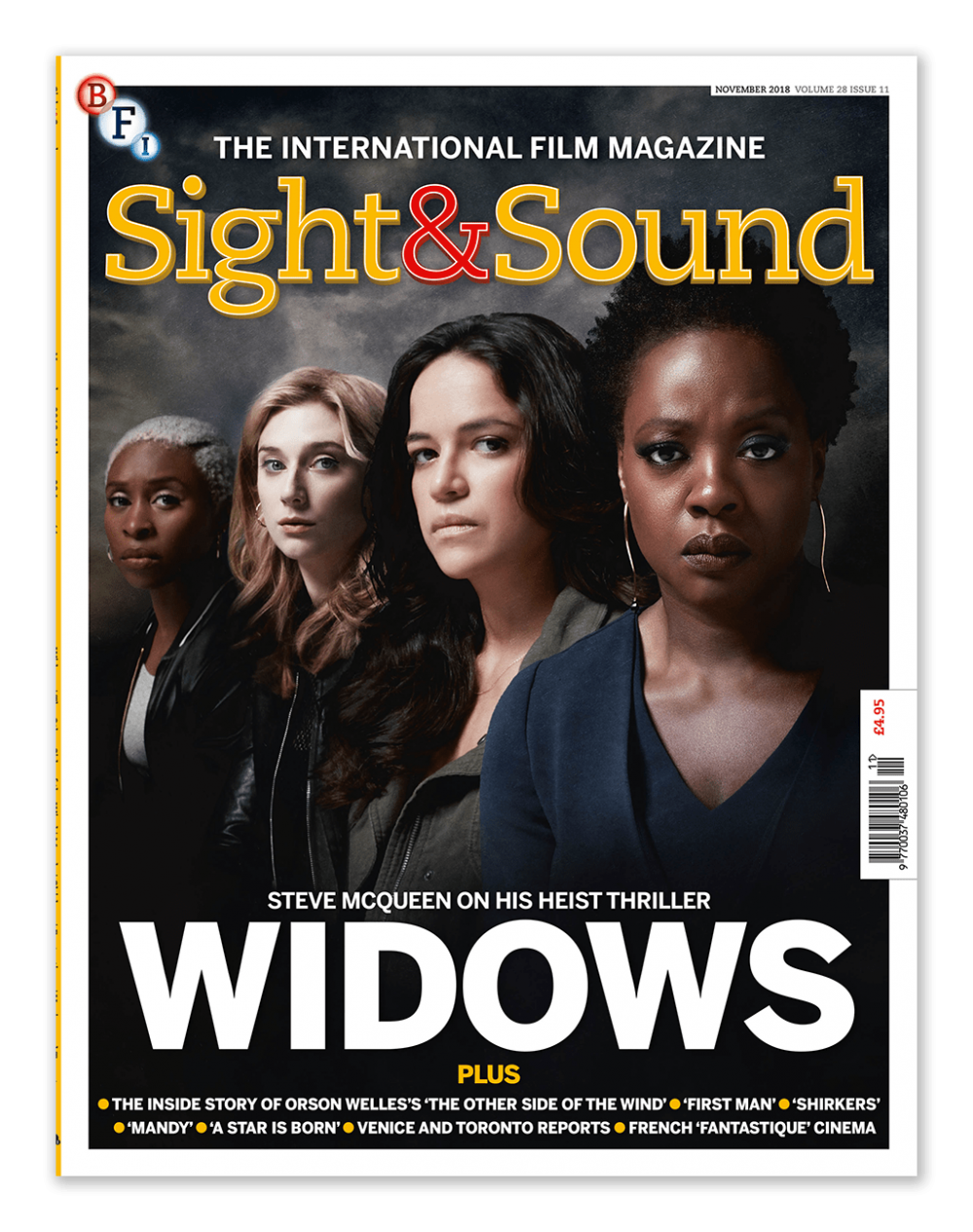
Our November issue comes equipped for a robbery, as we sit down with Steve McQueen to discuss his latest film Widows, a thriller that updates Lynda La Plante’s hit 1980s TV series about a group of women planning a heist in Thatcher-era London. McQueen’s thrilling film moves the action to present-day Chicago, with a brilliant Viola Davis leading an ensemble cast that includes Daniel Kaluuya, Colin Farrell, Liam Neeson, Michelle Rodriguez, Elizabeth Debicki, Brian Tyree Henry and Robert Duvall.
Posted to subscribers and available digitally 8 Ocotber
→ Buy a print edition
→ Access the digital edition
→
On UK newsstands 11 October
The news that the one-time Turner-prize winning artist McQueen had made a genre movie was greeted with surprise in some quarters, but McQueen tells James Bell about how he was excited by the thriller form and how, in these turbulent times in which we live, he felt a duty to make a film that would reach as many people as possible, while also exposing many of the issues that blight modern life, showing how political corruption intersects with street criminality, as well as the church, police and finance. “People talk about bubbles today, elitist bubbles, Brexit, Trump…” He says. “Now is the time to be inclusive. People come, but then there’s the political debate. What I wanted to do was to take the simple heist narrative and steep it in the politics of now.”
McQueen is also full of praise for his Oscar-winning lead actress, saying “You think of people like Katharine Hepburn, Bette Davis, Joan Crawford; icons in film. I could talk about Viola Davis in the same breath, easily.”
An actor who’s more iconoclastic than iconic is Nicolas Cage, who’s spent much of his time in recent years starring in absurd big-budget fantasies, but who has found a film to match his singular onscreen presence in the instant cult hit Mandy, in which he plays a lumberjack who takes revenge on an occult group of drug-addled bikers. Kat Ellinger talks to Mandy’s director Panos Cosmatos about his film, which she describes as “a heavy metal-fan comic book artist’s idea of arthouse meets video nasty”, and about the joys of working with Cage.
Of course, the quintessential Hollywood outsider was Orson Welles, and this month sees the very belated release of one of his late films, The Other Side of the Wind, which was shot in the early 1970s but never finished in Welles’s lifetime. However now thanks to the efforts of a small band of believers, a version of the film has been completed, following notes left by Welles. One of those believers, Joseph McBride, appears in the film itself, and was a consultant through its tortuous gestation and path to the screen. Writing in our new issue, McBride gives an insider’s account of his experiences, and an insightful analysis of this late work by one of cinema’s greatest artists.
A belated completion also marks Singaporean director Sandi Tan’s brilliant documentary Shirkers, which recounts the extraordinary story of how the debut feature she made with friends as a teenager in 1992 was snatched from her when its co-director ran off with the reels, only for those reels to turn up again 20 years later. Christina Newland talks to Tan about the pain of shattered creative dreams and what-ifs, and how making her documentary brought a sense of closure after so many years.
Finally in this month’s features pages, our regular Deep Focus series looks at the weird and wonderful word of the French fantastique in cinema. Published to tie in with a companion season programmed by Sight & Sound and running at London’s BFI Southbank from late October through November, Virginie Sélavy’s article explores the long and rich tradition of the cinematic fantastique, which incorporates elements of fantasy, horror and science fiction into a bizarre, atmospheric tales in which the unexplained and the supernatural intrude into reality. Taking in directors from Georges Méliès and Jean Cocteau to Georges Franju and Jean Rollin, Sélavy’s article is the essential accompaniment to the BFI Southbank season.
Autumn means it’s the time when the big festivals start unveiling the titles likely to compete for the major awards in the awards season early next year, and our November issue includes reports from two of the most important events: Venice and Toronto. Across both festivals were the films likely to dominate screens over the coming months, from Yorgos Lanthimos’s The Favourite to Jacques Audiard’s The Sisters Brothers, from Alfonso Cuarón’s moving Roma to Claire Denis’s typically idiosyncratic science-fiction film High Life, and from the Coen Brothers’s western The Ballad of Buster Scruggs to Barry Jenkins’s sumptuous If Beale Street Can Talk… our festival reports cover them all and more.
Elsewhere in the issue our reviews section covers all the month’s releases, including extended reviews of Bradley Cooper’s A Star is Born and Damien Chazelle’s First Man. Our Books pages include a definitive account of the making of Kubrick’s 2001: A Space Odyssey and a life of Bruce Lee. And our Home Cinema pages include a look at the early films of Olivier Assayas alongside a bounty of other curiosities.
All that, plus a fond remembrance of the late, great Burt Reynolds, an interview with Black Mother director Khalik Allah, a survey of the work of Margaret Tait, and much more besides.
Features
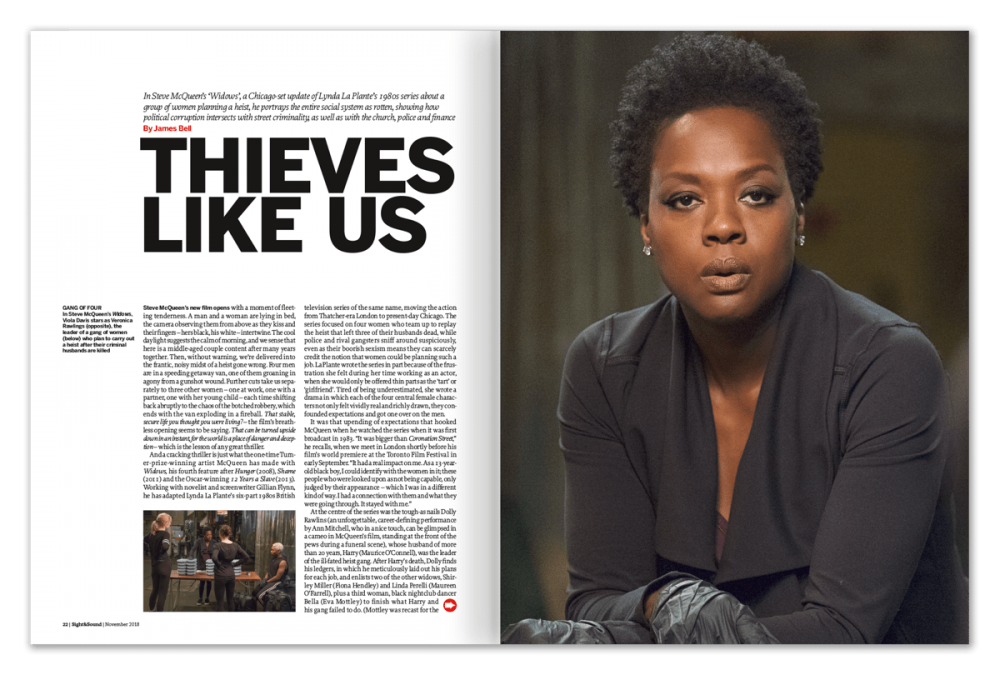
Thieves Like Us
In Steve McQueen’s Widows, a Chicago-set update of Lynda La Plante’s 1980s series about a group of women planning a heist, he portrays the entire social system as rotten, showing how political corruption intersects with street criminality, as well as with the church, police and finance. By James Bell.
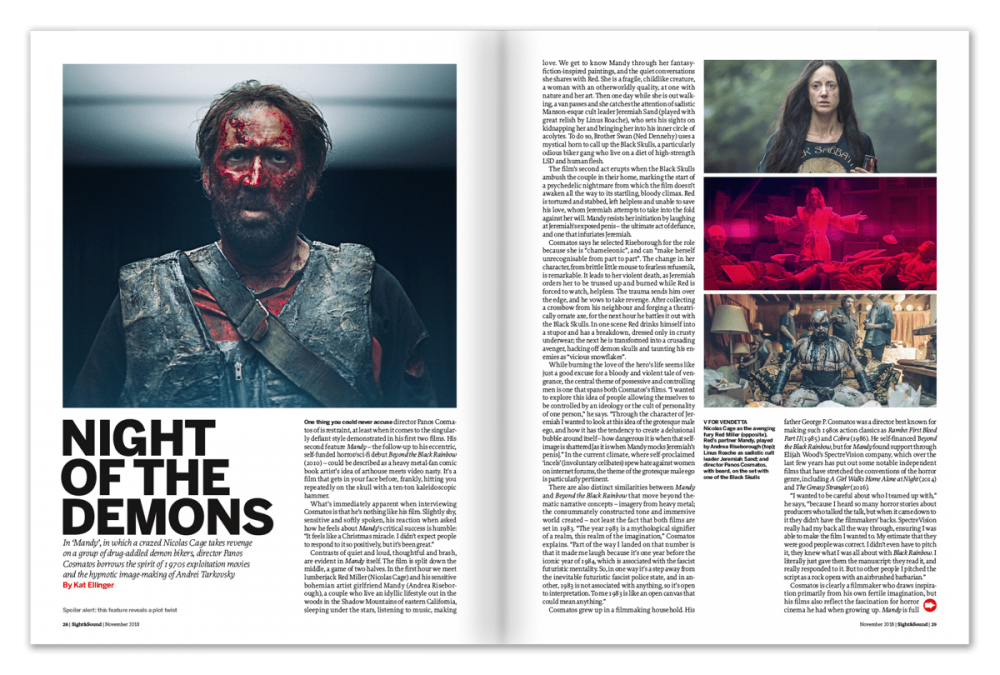
Night of the Demons
In Mandy, in which a crazed Nicolas Cage takes revenge on a group of drug-addled demon bikers, director Panos Cosmatos borrows the spirit of 1970s exploitation movies and the hypnotic image-making of Andrei Tarkovsky. By Kat Ellinger.
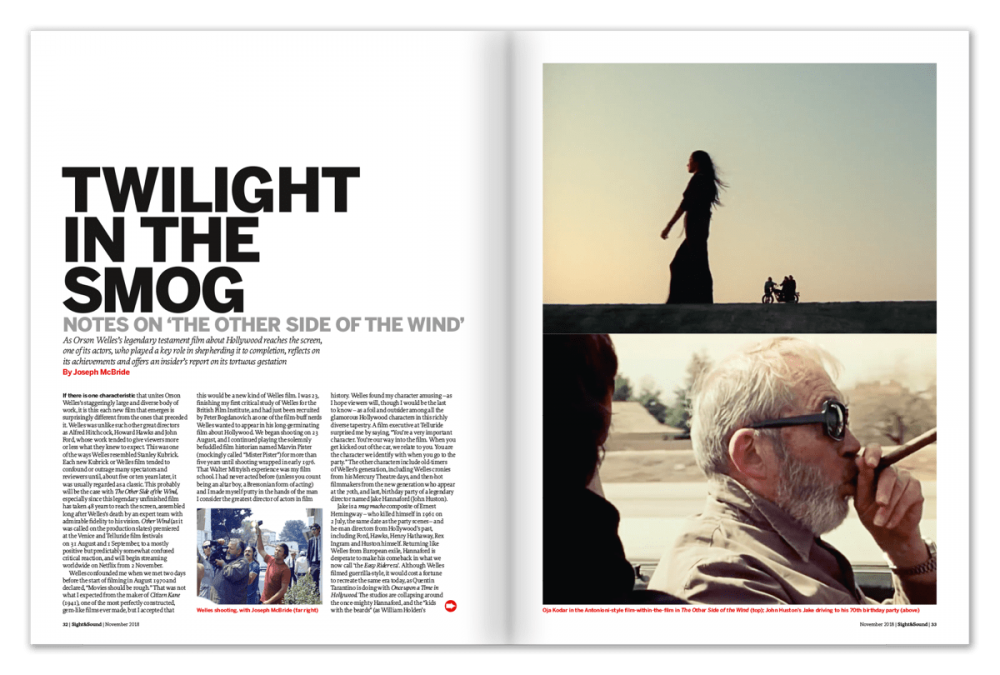
Twilight in the Smog: Notes on The Other Side of the Wind
As Orson Welles’s legendary testament film about Hollywood reaches the screen, one of its actors, who played a key role in shepherding it to completion, reflects on its achievements and offers an insider’s report on its tortuous gestation. By Joseph McBride.
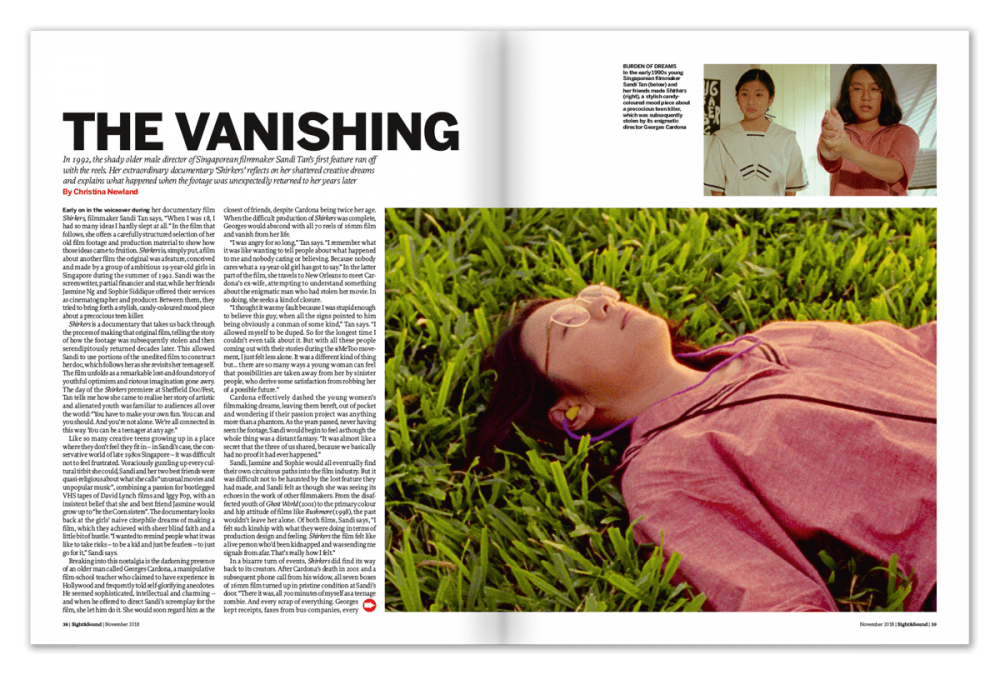
The Vanishing
In 1992, the shady older male director of Singaporean filmmaker Sandi Tan’s first feature ran off with the reels. Her extraordinary documentary Shirkers reflects on her shattered creative dreams and explains what happened when the footage was unexpectedly returned to her years later. By Christina Newland.
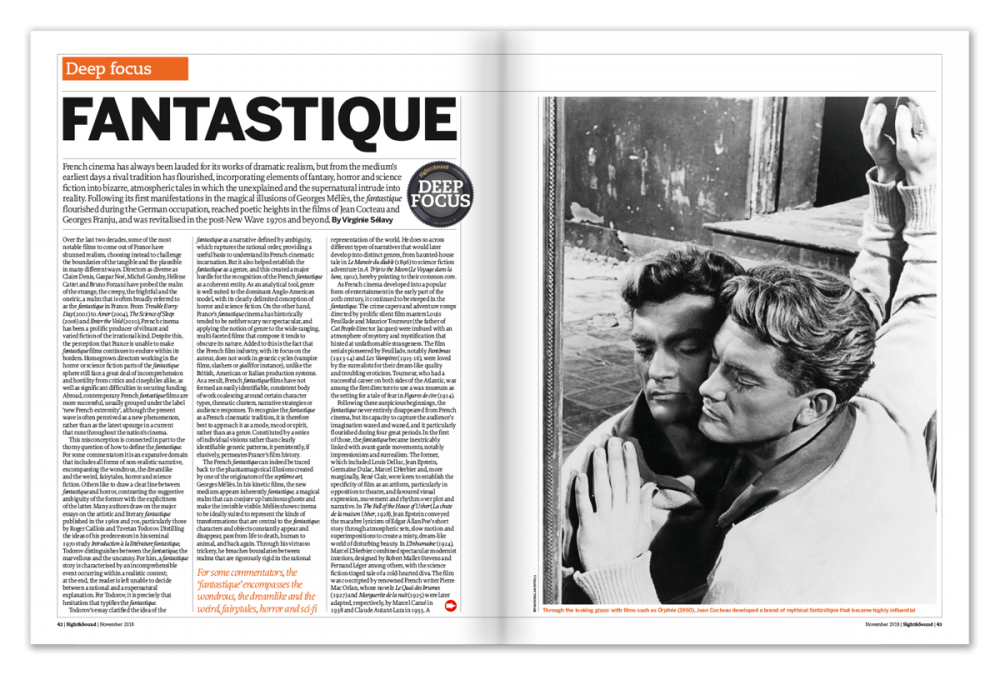
Deep Focus: Fantastique
French cinema has always been lauded for its works of dramatic realism, but from the medium’s earliest days a rival tradition has flourished, incorporating elements of fantasy, horror and science fiction into bizarre, atmospheric tales in which the unexplained and the supernatural intrude into reality. Following its first manifestations in the magical illusions of Georges Méliès, the fantastique flourished during the German occupation, reached poetic heights in the films of Jean Cocteau and Georges Franju, and was revitalised in the post-New Wave 1970s and beyond. By Virginie Sélavy.
Regulars
Editorial
The Clock, deadlines and new ideas of time
Rushes
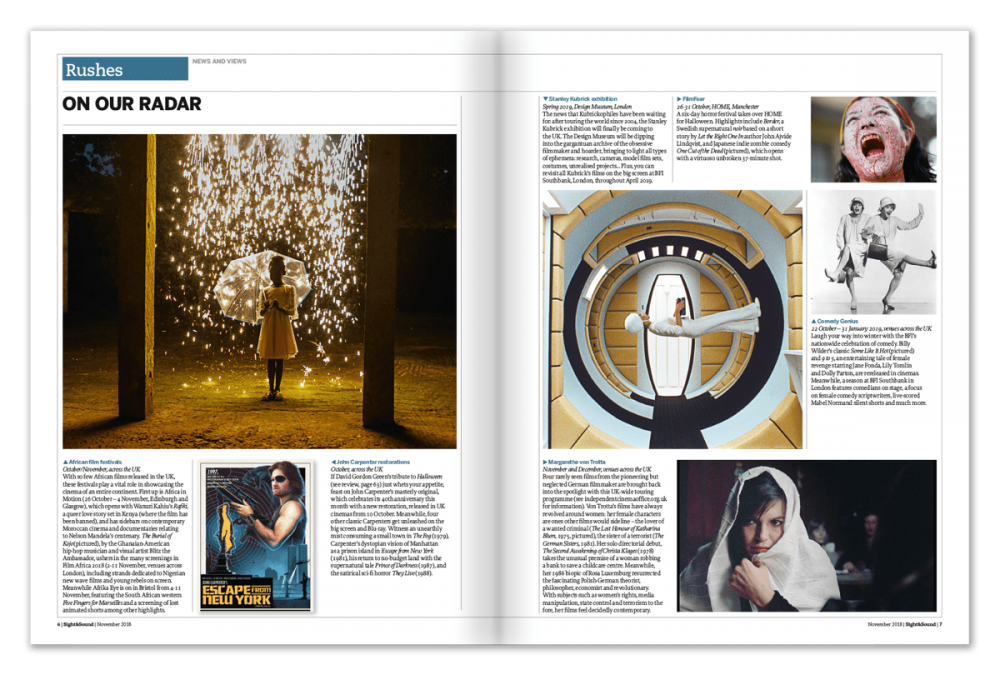
Our Rushes section
On our radar
African film festivals, John Carpenter restorations, Stanley Kubrick exhibition, FilmFour horror festival, Margarethe von Trotta retrospective, Comedy Genius season.
Interview: Island life
Khalik Allah’s documentary Black Mother is a thrilling, hallucinatory portrait of Jamaican life and history, with all its racial and sexual tensions. By Sophie Brown.
The numbers: BlacKkKlansman
Charles Gant on the success of Spike Lee films at the UK box office.
Obituary: Burt Reynolds, 1937-2018
Following his breakthrough in Deliverance, the actor’s easygoing screen persona made him one of the quintessential stars of the 1970s. By Nick Pinkerton.
Wide angle
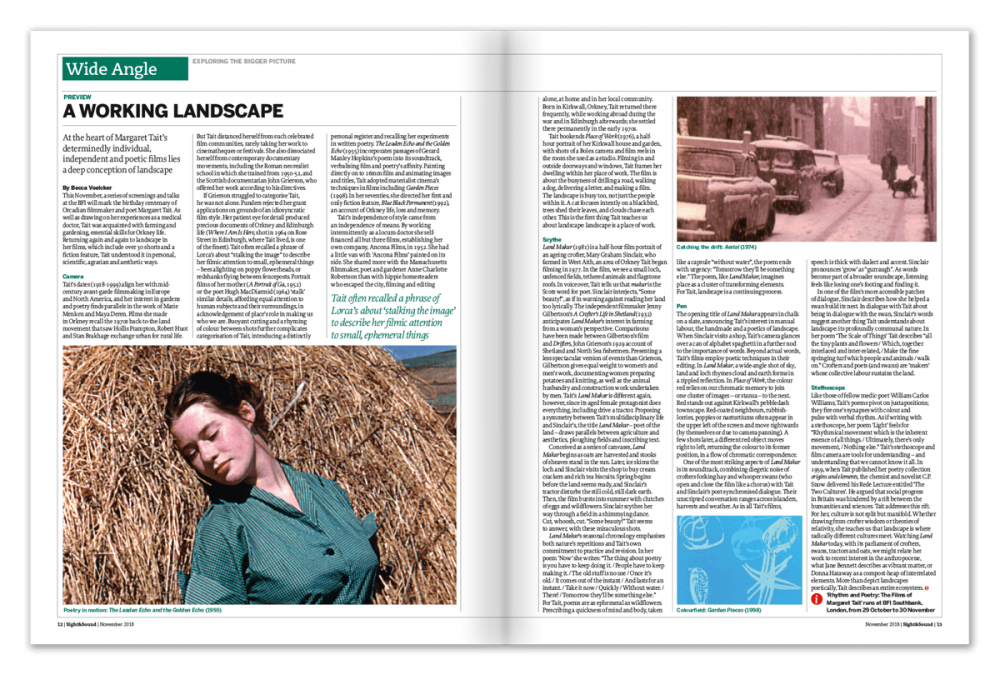
Our Wide Angle section
Preview: A working landscape
At the heart of Margaret Tait’s determinedly individual, independent and poetic films lies a deep conception of landscape. By Becca Voelcker.
Primal screen: The missing picture
The pioneering films of Australia’s McDonagh sisters, lost or largely forgotten for more than 80 years, are attracting attention again. By Neil Young.
Inside track: Hybrid vehicle
How a documentary about curating an art exhibition, Female Human Animal, mutated into a feature film about surrealism and hybridity. By Chloe Aridjis.
Festivals
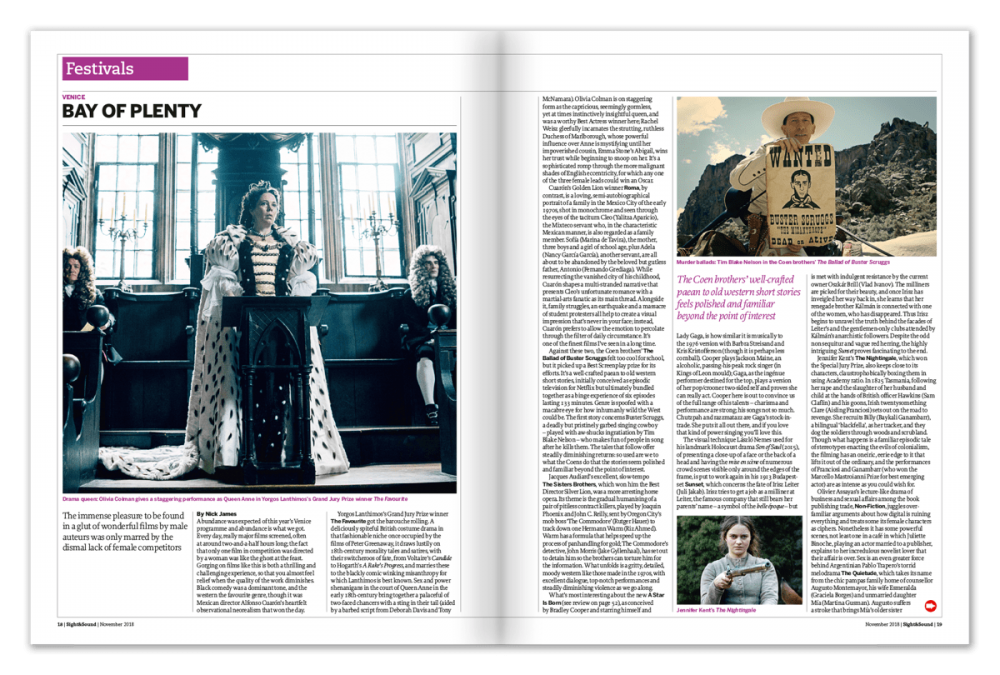
Bay of plenty: Venice
The immense pleasure to be found in a glut of wonderful films by male auteurs was only marred by the dismal lack of female competitors. By Nick James.
Signs of the times: Toronto
The programme for this audiencefriendly festival showed a keenness to acknowledge that the mainstream has shifted. By Pamela Hutchinson.
Reviews
Films of the month
First Man
A Star Is Born
Touch Me Not
plus reviews of
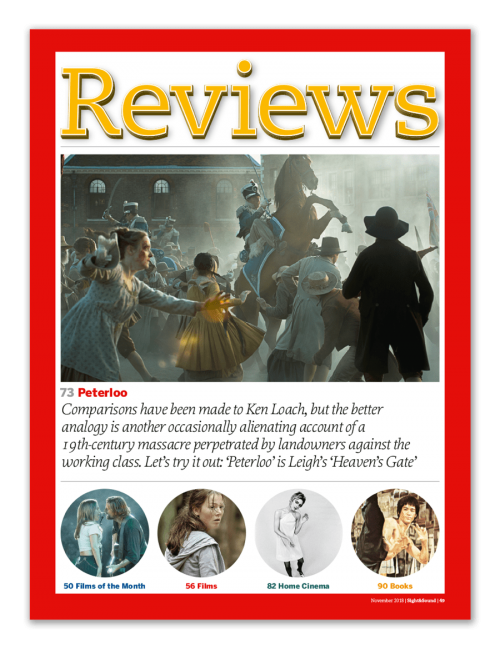
Our Reviews section
Back to Berlin
Bad Reputation
Blindspotting
The Captain
Crazy Rich Asians
Dogman
Don’t Worry, He Won’t Get Far on Foot
Escobar
An Evening with Beverly Luff Linn
Female Human Animal
Halloween
The Hate U Give
The House with a Clock in Its Walls
Jalouse
Juliet, Naked
King of Thieves
London Unplugged
Mandy
Mile 22
Mirai
Nancy
The Nun
Peterloo
Pili
Possum
The Predator
Shirkers
A Simple Favour
Sink
Two for Joy
U – July 22
Widows
Home Cinema features
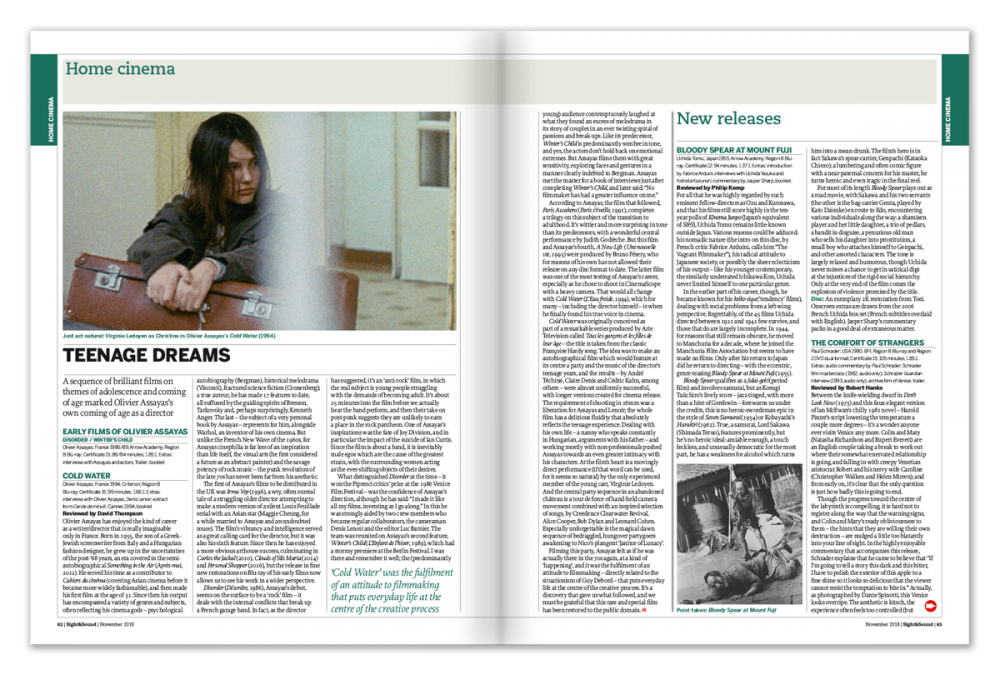
Our Home Cinema section
Teenage dreams: Early Films of Olivier Assayas + L’Eau froid
A sequence of brilliant films on themes of adolescence and coming of age marked Olivier Assayas’s own coming of age as a director. Reviewed by David Thompson.
Documentary: Six Films by Nikolaus Geyrhalter
Calmly, dispassionately, Nikolaus Geyrhalter’s documentaries point us toward the horrors that underlie today’s globalised system. Reviewed by Jonathan Rosenbaum.
Revival: Bitter Fame
Edie Sedgwick’s last film is both a valuable piece of pop art ephemera, and a cold-hearted record of degradation. By Christina Newland.
plus reviews of
Bloody Spear at Mount Fuji
The Comfort of Strangers
Death Laid An Egg
Eye of the Needle
The Man Who Cheated Himself
Ministry of Fear
The Miraculous Virgin
Missing
Salvador
Television: The Fishing Party, Our Day Out + The Imitation Game
Robert Hanks sighs for the heyday of the one-off drama.
Books
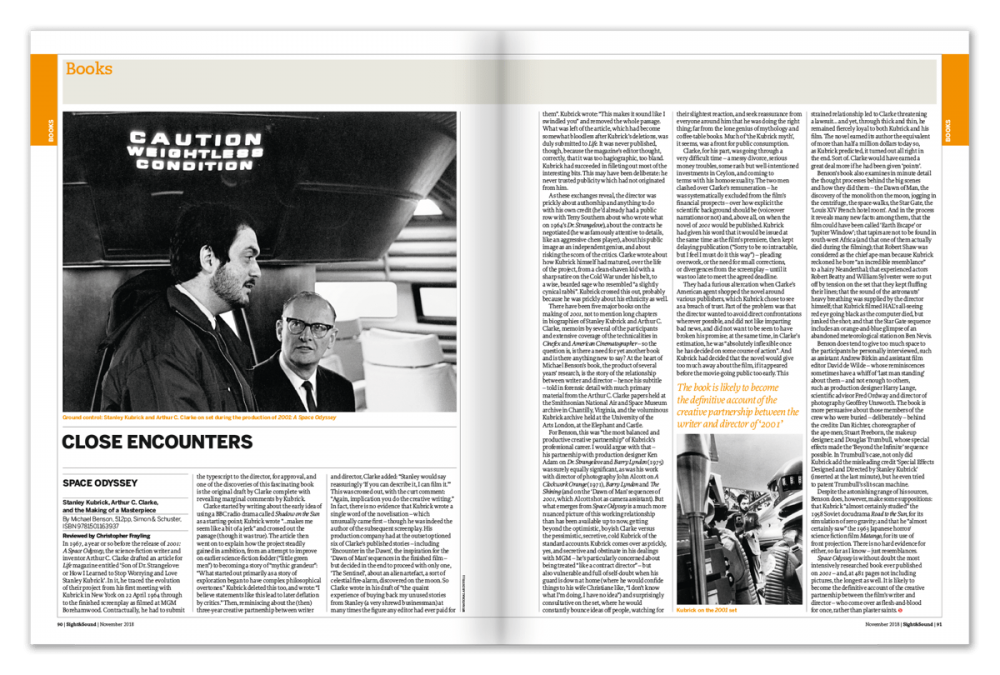
Our Books section
Stanley Kubrick, Arthur C. Clarke, and the Making of a Masterpiece by Michael Benson (Simon & Schuster) reviewed by Christopher Frayling
Scala Cinema 1978-1993 by Jane Giles (FAB Press) reviewed by Trevor Johnston
Bruce Lee: A Life by Matthew Polly (Simon & Schuster) reviewed by Nick Pinkerton
Letters
The class ceiling: Nottingham’s beacon history; justice for Mark Kermode; class dreamers
Tom Cruise’s long game
The joy of musicals: here we go again
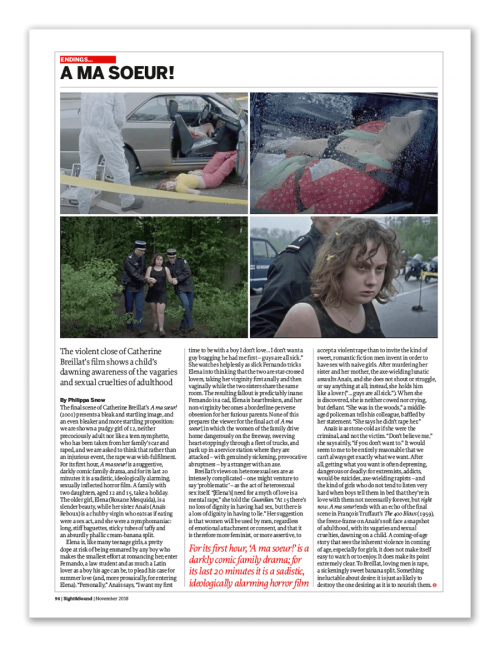
More flick lit: Silver Scream
Comedy Genius and forgotten clowns
Endings
À ma soeur!
The violent close of Catherine Breillat’s film shows a child’s dawning awareness of the vagaries and sexual cruelties of adulthood. By Philippa Snow.
→ Buy a print edition
→ Access the digital edition
→
Listen to our podcast discussion of Widows
Further reading
-
The Digital Edition and Archive quick link
Log in here to your digital edition and archive subscription, take a look at the packages on offer and buy a subscription.




